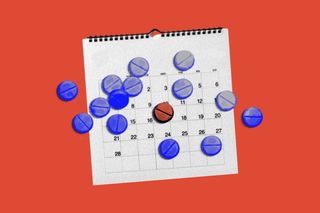
Is Delaying, Suppressing Periods Worth the Risk?
It’s okay to want to delay one’s periods once in a while. But to do so without consulting a doctor can be far from safe.

Being in charge of one’s menstrual calendar can be empowering — not to mention, convenient. Most of us have cursed our uteruses for choosing to shed at the awkwardest moments. The exasperation of realizing that their periods have arrived unannounced during a competitive exam, a long-awaited beach vacation, or worse still, in a pair of white shorts. While period stains aren’t — or, rather, shouldn’t — be embarrassing, most people wouldn’t prefer to stand at the sink, scrubing the blood off their favorite clothes for hours. Moreover, periods rarely come alone; cramps, bloating, and a whole host of other discomforts are mandatory travel companions. And so, if they could, most people would want to control when they get their period.
Historically associated with discomfort and inconvenience, menstruation can now be supressed, courtesy of modern medicine that has introduced hormonal contraceptives to our medical kits. “Your hormonal changes determine the timing of your periods… during the first two weeks of every month, the lining of the womb thickens due to the hormone oestrogen, which is produced by the ovaries. Progesterone preserves the uterine lining for the following two weeks after the ovulation phase to get ready for the entrance of a fertilised egg. However, if the pregnancy does not take place, progesterone levels fall significantly, which prompts the womb to lose its lining and signals the beginning of periods,” explains Dr. Varini N., an obstetrician and gynecologist from Bengaluru. The hormonal contraceptive pills are a synthetic form of progesterone (called norethisterone), that help maintain artificially elevated levels of the hormone in the body, thus delaying the onset of periods.
“Not having a period can significantly improve someone’s quality of life and ability to interact in the world, plus fewer missed days at school or work,” notes Dr. Sarah Prager, an obstetrician and gynecologist UW Medicine. According to Dr. Prager, there are a number of reasons — from chronic health conditions that cause one to bleed so much that they develop anemia and need blood transfusions, to avoiding the excruciatingly painful cramps that can accompany conditions like endometriosis and PCOS, to an endeavor to avoid the gender dysphoria that periods can induce among trans individuals — why one might want to suppress their periods.
Some progestin implants and IUDs can have much the same effect as pills containing norethisterone. But like most things that seem too good to be true, delaying one’s periods, too, comes with a catch.
Related on The Swaddle:
How the Morning‑After Pill Became the Most‑Used Birth Control for Young Indian Women
Ankita, who’s in her early 20s, took pills to delay her period because it coincided with a religious ceremony she was required to participate in. Speaking to The Kathmandu Post, she said, “My grandmother asked me to take the pill so that I can participate in the puja, and to make sure that nothing would be ‘impure’ for such an auspicious ritual… Even after I stopped taking the pills, I didn’t have my period for another week. And when I did, I had terrible cramps. The flow was irregular and heavy. I was bed-ridden for almost a week.”
Validating Ankita’s experience, Dr. Garima Sawhney, a gynecologist from Gurugram, mentions a number of side-effects that can follow menstrual suppression through pills. The rather long list includes nausea, dizziness, breast tenderness, development of rashes, weight gain, headaches, reduced sex drive, and mood swings. And when the periods finally do arrive, the bleeding is heavier than usual.
“[T]here are some women who should not use norethisterone to delay a period. These are women who are or could be pregnant, women who have just given birth and women who are breastfeeding. They also aren’t suitable for women with liver tumours, breast cancer and some other uncommon medical conditions,” Susan Walker, a reader in contraception, reproductive and sexual health at Anglia Ruskin University, wrote in The Conversation. “The way that norethisterone is metabolised in the body may also increase the likelihood of blood clots. So women who have had blood clots before or are at a higher risk of clotting should avoid using period delay tablets.”
But since womanhood has been culturally associated with pain and suffering, perhaps, we’re socially conditioned to be quick to dismiss the benefits of suppressing one’s periods. Dr. Prager says, “There’s nothing magic about having a period; it doesn’t confirm health. The presence of the menstrual cycle is to maintain the uterus in readiness for pregnancy. Bleeding does not serve another purpose.” Suppressing periods doesn’t impact one’s fertility, in the long term, either. And as Dr. Prager adds, “Modern people with uteruses have many more periods than people did [200 years ago].” They lived shorter lives and were pregnant more often.
Related on The Swaddle:
At the same time, in the same way that periods have been used to discriminate against women — by means of limited job opportunities, wage cuts, and taboos and stigma that prevent menstruating individuals from entering certain areas — period-suppressing pills, too, can become a way to police their bodies. The stigma of “impurity” surrounding periods that can lead to women being coerced into popping the pills — without being offered the chance to make an informed decision, let alone consent. “The puja was just around the corner, and so was my menstrual cycle, I was told to take the pills. I couldn’t say no… I don’t even know the name of the pill I took,” recalls Ankita.
But it’s not the misuse of the pill that renders it counterproductive; it’s not having access to non-judgmental doctors willing to explain the pros and cons of the exercise — much like with emergency contraceptives and birth control pills — that can render its use unsafe.
It is crucial for individuals to make informed decisions about menstrual suppression based on their medical advice tailored to their unique circumstances and bodies. “Whether they have a medical indication or the patient desires it — and that’s enough of a reason — they should be able to talk to a provider who is open and willing to hear their concerns and allows them to make the best decisions based on their health status and whichever methods would be safe and effective for them,” states Dr. Kathryn Stambough, an adolescent gynecologist and an assistant professor of obstetrics and gynecology at the University of Arkansas for Medical Sciences.
Takeaway: it’s okay to want to delay one’s periods once in a while. But to do so without consulting a doctor can be far from safe.
Devrupa Rakshit is an Associate Editor at The Swaddle. She is a lawyer by education, a poet by accident, a painter by shaukh, and autistic by birth. You can find her on Instagram @devruparakshit.
Related


TMI: People Tell Us What Their First Queer Sexual Experience Taught Them
